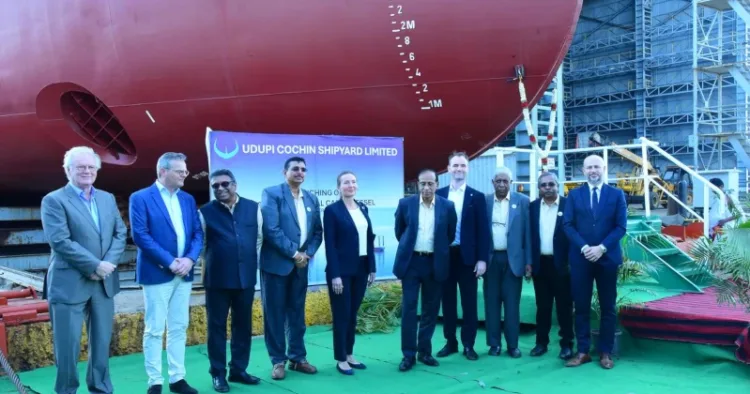In a significant milestone for the ‘Make in India’ initiative, Udupi Cochin Shipyard Limited (UCSL), a subsidiary of Cochin Shipyard Limited (CSL), celebrated the launch of its inaugural vessel from a series of six 3800 TDW General Cargo Vessels built for Norway’s Wilson ASA. This launch not only highlights the capabilities of Indian shipbuilding but also underscores the potential of domestic industries to meet international standards while contributing to the overarching goals of ‘Atma Nirbhar Bharat’, or Self-Reliant India.
The Importance of ‘Make in India’ and ‘Atma Nirbhar Bharat’
The ‘Make in India’ initiative, launched in 2014, aims to transform India into a global manufacturing hub, encouraging local and foreign companies to manufacture their products in India. This initiative is integral to the broader vision of ‘Atma Nirbhar Bharat’, which seeks to empower the country to be self-reliant in various sectors, including manufacturing, technology, and agriculture. By promoting local production, the initiative aims to reduce dependency on imports, create employment opportunities, and at the same time, foster innovation within the country.
UCSL’s successful construction and launch of vessels for Wilson ASA exemplifies these initiatives in practice. The internationally recognized Norwegian firm, headquartered in Bergen, is one of Europe’s leading operators in the short sea fleet market, transporting approximately 15 million tonnes of dry cargo across European waters each year. By partnering with Wilson ASA, UCSL is showcasing its capabilities and placing India on the global maritime map.
A Closer Look at the Vessel
The vessel launched by UCSL is a 3800 TDW General Cargo vessel, designed in collaboration with Conoship International, a distinguished Dutch firm. This part of the project signifies a confluence of Indian shipbuilding expertise and international design innovation focused on environmental sustainability. The new vessels are equipped with diesel-electric propulsion systems, underscoring a commitment to reducing environmental impact while facilitating efficient cargo transportation.
Each vessel measures 89.43 meters in length and 13.20 meters in breadth, presenting a design draft of 4.30 meters. With a maximum speed of 10.30 knots, the vessels are powered by a propulsion system comprising two electric motors of 375 kW each, supplemented by three diesel generators, each producing 416 kW. This unique configuration enhances performance and aligns with growing global demands for eco-friendly shipping solutions.
Strengthening Indo-Norwegian Relations
The launch event was graced by the presence of Martine Aamdal Bottheim, Minister Counsellor and Deputy Head of Mission at the Royal Norwegian Embassy, reflecting the strengthening ties between India and Norway in maritime collaboration. Such partnerships are crucial in building a robust global supply chain, especially in areas where the two nations can complement each other’s strengths. Norway, with its advanced maritime technology and expertise, combined with India’s evolving shipbuilding capabilities, presents a promising synergy that can lead to mutual benefits.
A Track Record of Success
Since its acquisition by Cochin Shipyard Limited, UCSL has made remarkable advancements, reinforcing its position as a reputable player in the global shipbuilding industry. The yard has successfully delivered multiple vessels—such as 62T Bollard Pull Tugs for Ocean Sparkle Limited and 70T Bollard Pull Tugs for Polestar Maritime Limited—and has also garnered repeat orders from these clients. This reflects the trust and confidence that both domestic and international clients place in UCSL’s capabilities.
Such accomplishments are vital in showcasing India’s potential in the defence and maritime sectors, which are critical for national security and economic development. India aims to bolster its maritime infrastructure by focusing on indigenous manufacturing while simultaneously creating jobs for its burgeoning workforce.
Challenges and Opportunities Ahead
While the achievements of UCSL are commendable, there are inherent challenges that the shipbuilding industry must navigate. These include fluctuations in global demand, competition from shipyards in other countries, and the need for continuous technological advancements. However, these challenges also present opportunities for growth and innovation. The robust framework established by initiatives like ‘Make in India’ and ‘Atma Nirbhar Bharat’ provides the necessary support for shipyards to innovate, invest in research and development, and upgrade their facilities.
Furthermore, with a keen focus on sustainability, the Indian maritime sector has an opportunity to lead the way in producing greener vessels for international markets. As environmental regulations tighten globally, demand for eco-friendly shipping solutions will likely increase. Indian shipbuilders, by investing in cleaner technologies and sustainable practices, can position themselves favourably in the global market.
Future Prospects
As UCSL continues to expand its operations and client portfolio, the path ahead looks promising. The focus on quality shipbuilding and adherence to international standards is anticipated to drive future growth for UCSL and India’s maritime sector as a whole. With the Indian government actively working to attract foreign investment and promote local manufacturing, there lies a wealth of potential for expanding shipbuilding capacity.
Launching the vessel for Wilson ASA is not just a milestone for Udupi Cochin Shipyard; it is a beacon of hope for the entire Indian maritime industry. As the world shifts towards more sustainable practices, Indian shipbuilders can lead the innovation of eco-friendly solutions while enhancing productivity and operational efficiency.
Launching the vessel at Udupi Cochin Shipyard represents a significant leap forward in India’s journey towards self-reliance and global competitiveness. It encapsulates the spirit of ‘Make in India’, showing that with dedication, innovation, and collaboration, Indian industries can compete on the world stage. The successful partnership with Wilson ASA is a testament to the feasibility of this ideal. As India navigates through the complexities of global markets, initiatives like ‘Atma Nirbhar Bharat’ and ‘Make in India’ will be critical in steering the country towards a promising, self-sufficient future, one vessel at a time.



















Comments